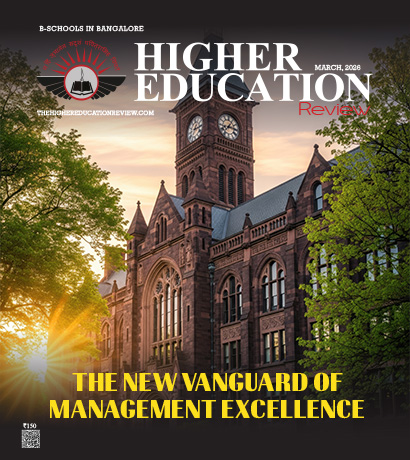Lokmangal College Of Agriculture: Advancing Indian Agriculture Through Innovative Education

Hon. Rohanji Dashmukh, Chairman, Lokmangal College Of Agriculture
Indian agriculture sector is facing challenges amid rapid climate change, persistent droughts, and soil degradation, which threaten food security for a population exceeding 1.4 billion. More than half of the fertile land suffers water shortage, and innovative methods are required to counter the resistance of pests and standstill of production.
At the same time, the industry is experiencing a strong market growth that is estimated to reach 580 billion by 2028 due to the innovations in modified crops, precision agriculture, and sustainable farming.
Lokmangal College of Agriculture addresses these challenges by equipping its students with cutting edge knowledge in crop production, irrigation management, crop protection, pre and post-harvest management, dairy and livestock management.
Under the dynamic guidance of Subhash Gopal Deshmukh, the college was established in 2008 and began its operations as a constituent institution of Shriram Gramin Sanshodhan VA Vikas Pratishthan in the year 2009-10.
Certified by MCAER Pune and affiliated to Mahatma Phule Krishi Vidyapeeth (MPKV), Rahuri, it has evolved over the years with other modest beginnings in a challenging environment, and presently is an A-grade institution that focuses on imparting practical training to resolve practical issues such as low productivity and water shortage etc.
Research-Driven Curriculum
With a strong focus on blending theoretical knowledge with hands-on practical experience, the college ensures that students are well-prepared to face real-world challenges in the agriculture sector. Subjects such as Agronomy, Horticulture, Soil Science, Animal Husbandry, Agricultural Engineering, Agricultural Economics, Entomology, Genetics, Botany, and Extension Education are taught with the support of its experienced faculty and well-equipped laboratories.
Unique to the institution is its focus on skill-based electives aligned with the New Education Policy (NEP), incorporating AI in agriculture despite it not being in the core syllabus. This approach ensures graduates are adept at emerging technologies such as precision farming and genetic engineering, helping them tackles sustainability challenges head-on. The experiential modules like vermicomposting, nursery management, vegetable farming, mushroom farming, and dairy processing to final year students, has been one of the pillars of teaching in the college.
"Lokmangal College of Agriculture envisions itself as a centre of excellence in agricultural education and rural development, with ambitious plans to drive innovation and sustainability"
Sustainable Farming Practices
The college places special emphasis on practical exposure, organizing regular field visits, industrial tours, and study programs in collaboration with KVKs, research institutions, and agribusiness firms. These activities enable students to observe real-life farming operations, new technologies, and best practices in agriculture.
“Our faculty ensures that students gain not only subject knowledge but also practical skills in areas such as crop production, livestock management, irrigation systems and agribusiness operations”, says Amol Shinde, Principal, Lokmangal College of Agriculture.
Final year students involved in the Rural Agricultural Work Experience (RAWE) program spend a semester with farmers learning together and putting their theoretical knowledge into practical practice and conducting workshops on such sustainable agricultural practices as bio pesticides and vermicomposting. This bridges the theory-practice divide, empowering students to provide free consultancy to rural farmers, thus elevating community-level agriculture.
“We support entrepreneurship by offering alumni success stories, with more than 250 graduates in government positions, 200 in the privately owned areas, and many in banking or agro-based startups”, says Amol Shinde.
Scholarships are very important in the democratization of quality education. The college is running its proprietary UDAN Lokmangal scholarship, under which up to ₹25,000 is offered each year to the categorized students who have a rural and middle-compromised background based on a 100-mark evaluation.
The initiative will be open to all students regardless of gender, caste or even quota with only 50 or above marks as minimum requirement and maximum ₹25,000 or equivalent to one semester fee as maximum payment to the top performers. It has helped many students and this reflects how the college is focusing on the provision of rural talent.
The Road Ahead
Looking ahead, Lokmangal College of Agriculture aims to become autonomous within five to seven years and to be ICAR accredited to initiate postgraduate programs in agriculture in the private college, which are not common in Maharashtra. The college envisions itself as a centre of excellence in agricultural education and rural development, with ambitious plans to drive innovation and sustainability.
To become an innovative institution that teaches sustainable agriculture, the college is set to develop a Center of Innovation in Sustainable Agriculture, include smart agriculture such as IoT, drones and automated farming, crop monitoring tools based on AI, and launch Agri-entrepreneurship startup incubation programs to introduce student-led entrepreneurial businesses.
Additionally, it plans to develop online and hybrid learning modules in vernacular languages to reach a broader student base. These innovations are aimed at nurturing the next generation of agricultural scientists, technocrats, and rural entrepreneurs who can lead India towards food security and environmental resilience.
At the same time, the industry is experiencing a strong market growth that is estimated to reach 580 billion by 2028 due to the innovations in modified crops, precision agriculture, and sustainable farming.
Lokmangal College of Agriculture addresses these challenges by equipping its students with cutting edge knowledge in crop production, irrigation management, crop protection, pre and post-harvest management, dairy and livestock management.
Under the dynamic guidance of Subhash Gopal Deshmukh, the college was established in 2008 and began its operations as a constituent institution of Shriram Gramin Sanshodhan VA Vikas Pratishthan in the year 2009-10.
Certified by MCAER Pune and affiliated to Mahatma Phule Krishi Vidyapeeth (MPKV), Rahuri, it has evolved over the years with other modest beginnings in a challenging environment, and presently is an A-grade institution that focuses on imparting practical training to resolve practical issues such as low productivity and water shortage etc.
Research-Driven Curriculum
With a strong focus on blending theoretical knowledge with hands-on practical experience, the college ensures that students are well-prepared to face real-world challenges in the agriculture sector. Subjects such as Agronomy, Horticulture, Soil Science, Animal Husbandry, Agricultural Engineering, Agricultural Economics, Entomology, Genetics, Botany, and Extension Education are taught with the support of its experienced faculty and well-equipped laboratories.
Unique to the institution is its focus on skill-based electives aligned with the New Education Policy (NEP), incorporating AI in agriculture despite it not being in the core syllabus. This approach ensures graduates are adept at emerging technologies such as precision farming and genetic engineering, helping them tackles sustainability challenges head-on. The experiential modules like vermicomposting, nursery management, vegetable farming, mushroom farming, and dairy processing to final year students, has been one of the pillars of teaching in the college.
"Lokmangal College of Agriculture envisions itself as a centre of excellence in agricultural education and rural development, with ambitious plans to drive innovation and sustainability"
Sustainable Farming Practices
The college places special emphasis on practical exposure, organizing regular field visits, industrial tours, and study programs in collaboration with KVKs, research institutions, and agribusiness firms. These activities enable students to observe real-life farming operations, new technologies, and best practices in agriculture.
“Our faculty ensures that students gain not only subject knowledge but also practical skills in areas such as crop production, livestock management, irrigation systems and agribusiness operations”, says Amol Shinde, Principal, Lokmangal College of Agriculture.
Final year students involved in the Rural Agricultural Work Experience (RAWE) program spend a semester with farmers learning together and putting their theoretical knowledge into practical practice and conducting workshops on such sustainable agricultural practices as bio pesticides and vermicomposting. This bridges the theory-practice divide, empowering students to provide free consultancy to rural farmers, thus elevating community-level agriculture.
“We support entrepreneurship by offering alumni success stories, with more than 250 graduates in government positions, 200 in the privately owned areas, and many in banking or agro-based startups”, says Amol Shinde.
Scholarships are very important in the democratization of quality education. The college is running its proprietary UDAN Lokmangal scholarship, under which up to ₹25,000 is offered each year to the categorized students who have a rural and middle-compromised background based on a 100-mark evaluation.
The initiative will be open to all students regardless of gender, caste or even quota with only 50 or above marks as minimum requirement and maximum ₹25,000 or equivalent to one semester fee as maximum payment to the top performers. It has helped many students and this reflects how the college is focusing on the provision of rural talent.
The Road Ahead
Looking ahead, Lokmangal College of Agriculture aims to become autonomous within five to seven years and to be ICAR accredited to initiate postgraduate programs in agriculture in the private college, which are not common in Maharashtra. The college envisions itself as a centre of excellence in agricultural education and rural development, with ambitious plans to drive innovation and sustainability.
To become an innovative institution that teaches sustainable agriculture, the college is set to develop a Center of Innovation in Sustainable Agriculture, include smart agriculture such as IoT, drones and automated farming, crop monitoring tools based on AI, and launch Agri-entrepreneurship startup incubation programs to introduce student-led entrepreneurial businesses.
Additionally, it plans to develop online and hybrid learning modules in vernacular languages to reach a broader student base. These innovations are aimed at nurturing the next generation of agricultural scientists, technocrats, and rural entrepreneurs who can lead India towards food security and environmental resilience.

